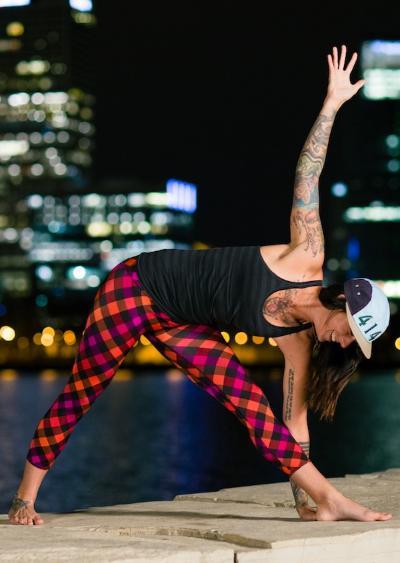Jozi Tatham '18

Q. What made you decide to pursue an MA in Yoga Studies?
I had been teaching public yoga classes for years, owned and operated an independent yoga studio, led trainings, the whole full-time yoga teacher gamut, but I knew something was lacking from my own certifications. I come from an entirely too academically-steeped background and I will likely never stop chasing higher levels of knowledge, so finding a program that threaded together my previous life in academia and my current life in yoga felt like destiny. It was perfect timing to begin a new chapter of my life, to move away from the comfort of my home city and force myself to expand into greater depths of wisdom and self-exploration. As a teacher, I believe that we can never learn enough. We have a responsibility to share our experiences with as much critical thought as possible, after having questioned, examined and tested them, viewing life from all sides. This Master's Degree provided me with a massive tool belt to do just that.
Q. What was your favorite course, and what was it like?
My favorite course was Health Science and Yoga because I'm a through and through anatomy nerd. Learning the subtle bodies and human anatomy challenged my understanding of how to use the physical body. Moreover, it taught me how to speak to this in a public class setting that forces the practitioner to think about it in unique, sometimes transformative ways. In this course, we explored our own energetic make-ups as well, identifying our dominant doshas, gunas, behavioral patterns, and how we could design a practice that supports a healthy balance.
I also greatly enjoyed our study of Sanskrit and the various approaches we took to learn it through grammar and translation. It was challenging because I hadn't taken a foreign language course since I was in high school, but it was particularly rewarding to find that my brain could still make sense of something so different from my own language. It became almost a mathematical equation to solve and required a lot of attention, focus, and sweaty palms to get through. All this said, it ultimately brought our cohort even closer together as friends. We spent endless hours together on homework and practice outside of class, which brought laughs, tears, and in the end, high fives.
Q. What work are you doing now, and how did the MA in Yoga Studies play into that?
In September 2018 I opened a yoga studio with the intention of providing public classes that explore more “traditional,” well-rounded practices of yoga rather than offering solely strong asana (posture) classes. Meditation, pranayama, mudra, mantra, and a foundational understanding of the subtle bodies build the signature class that we offer on our regular schedule. Beyond weekly classes, we also offer educational courses with in-depth discussions in yoga philosophy, an interest of mine that was sparked through the course of my studies in LMU’s Master of Arts in Yoga Studies program. Understanding the evolution of yoga throughout history and how it has served its practitioners has created a much more intimate bond for me personally and moved me deeper than just the physical practice. I am now prepared to educate students, train teachers, and offer a deeper practice to my community.
Q. Any advice for future MA in Yoga Studies students?
I would advise anyone in a graduate program to utilize the support of your cohort, share insights, wisdom, experiences, ideas, struggles, and have fun with each other. It is easy to get way too serious in school and forget to take time to live right where you are. Your individual practice, whatever that looks like (yoga, meditation, walking your dog, reading a book, art, music, dance, whatever it is) will ground you back into the moment to moment ease of being present and lessen the burden of homework, papers, finals, etc. Practice with your cohort, practice by yourself, be a friend and ask for friendship. If there's one thing I learned from the program that feels intrinsically applicable to our current era it's that we are communal creatures that require connection and therefore, the movement of yoga from the solitary cave dweller back to the shared public setting is necessary. Don't isolate yourself with this material, use it to bring yourself closer to a community that is willing and able to dive into the proverbial fire of knowledge and come out having been liberated and transformed together.